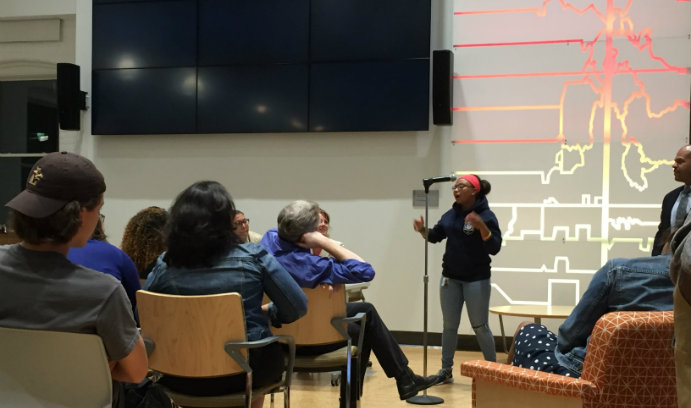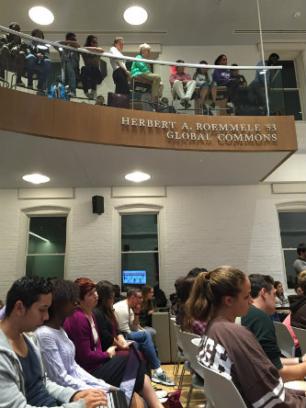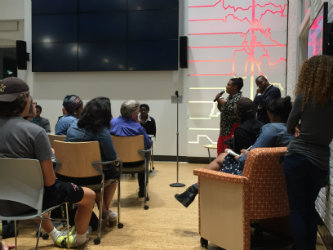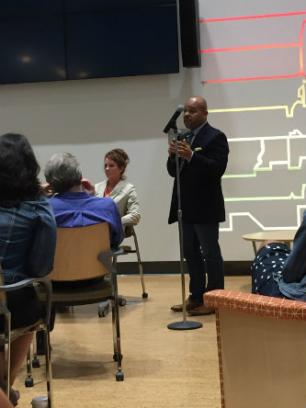'These Are Not Tragedies'

Kevelis Matthews-Alvarado ’20 speaks at the open forum on protest and policing.
Last week, James Peterson received a “very emotional” email from his Lehigh colleague, Sirry Alang.
“[Alang’s email] basically reminded me of the experience that I think a lot of us have, week in and week out over the years, when we see sometimes unarmed civilians losing their lives in encounters with law enforcement,” Peterson, associate professor of English and director of Africana Studies, told a crowd of students, faculty and staff in the Roemmele Global Commons of Williams Hall on Wednesday evening.
“Sadly, this has become an epidemic... And Sirry’s directive was basically, ‘Do something, Peterson. Do something.’”
The “something” Peterson did was to invite the Lehigh community to an open forum on protest and policing in the United States. Shootings by police of African Americans have sparked both peaceful and violent protests in a number of U.S. cities, including Baltimore, Dallas and Ferguson, Missouri, in recent years. The fatal shootings last week of Terence Crutcher in Tulsa, Oklahoma, and Keith Lamont Scott in Charlotte, North Carolina, prompted Alang’s email and Peterson’s response. The day before the forum, another black man, Alfred Olango, was shot and killed by police in El Cajon, California.
The forum drew a large crowd, as people perched on the balcony above the commons and overflowed into the hallway outside. The turnout, said Peterson, reflected the importance of the conversation.
“This is a beginning,” he said. “Nothing is going to get resolved here this evening, but hopefully we can chart a course through which, as a university community, we can make informed decisions and become more aware about some of the important social justice issues that we’re confronted with in the 21st century.”
“The purpose of this forum is to create a space for us to start having these conversations [and] create a space for you to ask questions, share your thoughts, talk about how you’re feeling: how angry you are, what you really want to do, what you envision for us as a society,” said Alang, an assistant professor of sociology and health, medicine and society.
Panelists included Peterson; Alang; Bruke Mammo ’17, a computer science and business major; Karen Valerio ’17, an Africana Studies student; Saladin Ambar, department chair and associate professor of political science; and Holona Ochs, associate professor of political science. The forum opened with panelists sharing brief thoughts. Many audience members then shared thoughts, feelings and personal experiences with the gathered crowd.
“I think the way I’d like to engage the discussion is to think about the way these encounters with law enforcement are described, but also the way the resistance to these encounters are described,” said Ambar. “These are not tragedies, these deaths. A boy or girl drowning in a swimming pool, the Hindenburg: Those are tragedies. These are political events. ... This is about willful political violence in a citizenry, all of us, myself included, who countenanced it for too long, who sat behind our professionalism, our privilege, being white or otherwise, and have not raised our voices appropriately enough to condemn acts that are inhuman and inhumane.”
‘If I were to become the hashtag’
A discussion emerged about the viewing of footage taken and shared via social media of the deaths of African Americans at the hands of the police.
“On social media there’s this conversation about do we or don’t we repost these videos,” said Natanya Duncan, assistant professor of history. “Is it a way of distancing ourselves from what is really happening, or should we be posting, should we be bearing witness, should we be holding account for ourselves and for our neighbors by continuing to make sure that people see this and realize it is happening in real time in the modern day?”
Panelists and participants had varying opinions.
“I personally have decided not to participate in the consumption of black death as shared online, but I do still completely understand the side of wanting to have it in people’s faces,” said Valerio.
“When I think about what would happen if I were to become the hashtag, I would want that video out there,” said Mammo, who is vice chairman of Region II of the National Society of Black Engineers. “I would want the people who know me personally from the All Lives Matter crowd or the Blue Lives Matter crowd, those people who know me, who know that I’ve done nothing wrong with my life, who know for a fact that I don’t have a criminal record, who know for a fact that I’ve never possibly held any kind of malcontent in my life, I’d want them to see this. I’d want them to see the person that they knew, the person that they got in Facebook arguments with. I’d want them to see what happened. I’d want them to see this and to ask themselves, ‘Is this enough? What will it take?’”
Ochs and Peterson focused on the intent of those who view and disseminate videos.
“Are we celebrating this violence? Are we making people care? We don’t have any idea how people are reacting to this, and it makes it hard for us to organize and figure out how to mobilize resistance without encouraging the violence,” said Ochs. “And I wish I had an answer. I just want that to soak in. The level of violence here is beyond the pale.”
“The majority of the families that I’ve encountered and had an opportunity to be with in these awful situations, they do want the videos to be circulated,” said Peterson. “... It’s not that they want it to be circulated because they want to sensationalize the death of their loved one, they want it to be circulated because they want people to see what the state has done to their father, mother, brother or sister. So that’s a tough conundrum. But I think what we have to all do is be accountable to what our interaction is with the material. ... The families sometimes want those videos to be circulated because they won’t get justice any other way. And in fact we wouldn’t know all these names, you don’t know all those names and all these issues without some of those videos.”
Participants in the forum also discussed, among several topics, the challenges of institutional change; the importance of recognizing progress when it’s made; the necessity of building community; and learning from, challenging and engaging all community members—students, faculty and staff—in meaningful, honest discussion. Mammo wondered how the conversation can be extended to those not present at the forum.
“The fact of the matter is, these conversations have been just another conversation for 30-plus years. We’re still having the same conversations. Every four years, it’s a new group of students. Every four years, [we’re] still having the same conversation, still having the same things take place on this campus, still having the same things take place in this country,” said Mammo. “... [The people here tonight] are the people who want to be here, the people who know how important this is. ... The next step is to figure out how we can get the people who aren’t coming.”
Kevelis Matthews-Alvarado ’20 performed a spoken word piece written and originally performed by Javon Johnson, a poet and assistant professor at San Francisco State University.
“It’s still so relevant,” said Matthews-Alvarado before reciting the piece, titled “‘cuz he’s black,” which depicts a conversation between a young black man and his four-year-old nephew about the police.
Later, Matthews-Alvarado urged all students to speak up, regardless of age.
“Just because you’re young or you’re afraid someone is going to look at you some type of way, don’t be afraid to put yourself out there and have these tough conversations and share your opinions with people who might not understand where you’re coming from,” she said.
The forum was sponsored by the political science department, the Martin Luther King Committee, Africana Studies and the Black Student Union.
Posted on:







